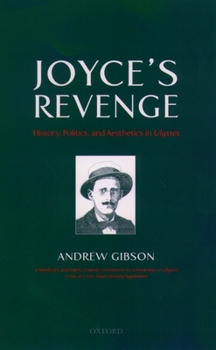Joyce's Revenge: History, Politics, and Aesthetics in Ulysses
Select Format
Select Condition 
Book Overview
The Ireland of Ulysses was still a part of Britain. This book is the first comprehensive, historical study of Joyce's great novel in the context of Anglo-Irish political and cultural relations in the period 1880-1920. The first forty years of Joyce's life also witnessed the emergence of what historians now call English cultural nationalism. This formation was perceptible in a wide range of different discourses. Ulysses engages with many of them. In doing so, it resists, transforms and works to transcend the effects of British rule in Ireland. The novel was written in the years leading up to Irish independence. It is powered by both a will to freedom and a will to justice. But the two do not always coincide, and Joyce does not place his art in the service of any extant political cause. His struggle for independence has its own distinctive mode. The result is a unique work of liberation--and revenge. This eminently learned but lucidly written book transforms our understanding of Joyce's Ulysses. It does so by placing the novel firmly in the historical context of Anglo-Irish political and cultural relations in the period 1880-1920. Gibson argues that Ulysses is a great work of liberation that also takes a complex form of revenge on the colonizer's culture.
Format:Paperback
Language:English
ISBN:019928203X
ISBN13:9780199282036
Release Date:April 2005
Publisher:OUP Oxford
Length:320 Pages
Weight:0.90 lbs.
Dimensions:0.7" x 5.5" x 8.5"
Customer Reviews
0 rating





